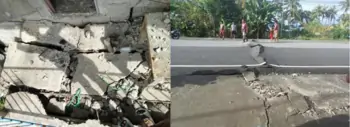
Table of Contents
A 5.8-magnitude earthquake jolted Southern Leyte early Thursday morning, January 23, 2025, leaving behind damaged infrastructure and roads. The Philippine Institute of Volcanology and Seismology (Phivolcs) reported that the tremor struck at 7:39 a.m., with its epicenter located six kilometers southeast of San Francisco, Southern Leyte, at a depth of 14 kilometers. Initially recorded at 5.9 magnitude, it was later revised to 5.8 in a subsequent bulletin.
The quake, caused by the movement of tectonic plates, was classified as strong, prompting immediate concern for public safety and infrastructure in affected areas across Visayas and Mindanao.
Reported Intensities Across Regions
Intensity 6: Very Strong
- San Francisco, Southern Leyte
Intensity 5: Strong
- Southern Leyte: Anahawan, Hinunangan, Hinundayan, Libagon, Liloan, Padre Burgos, Pintuyan, San Juan, and San Ricardo
Intensity 4: Moderately Strong
- Leyte: Abuyog, Bato, Baybay City, Hilongos, Hindang, and Inopacan
- Southern Leyte: Bontoc, Limasawa, City of Maasin, Macrohon, Malitbog, Saint Bernard, Silago, Sogod, and Tomas Oppus
Intensity 3: Weak
- Cebu City
- Leyte: Alangalang, Albuera, Barugo, Burauen, Carigara, Dagami, Dulag, Jaro, Javier, Julita, Kananga, MacArthur, Mahaplag, Mayorga, Merida, Palo, Santa Fe, Tanauan, and Tolosa
- Surigao del Norte: Surigao City
Intensity 2: Slightly Felt
- Leyte: Babatngon, Isabel, and Palompon
- Cagayan de Oro City
Intensity 1: Scarcely Perceptible
- Eastern Samar: Can-Avid
- Camiguin: Mambajao
- Cebu: San Francisco
Instrumental readings confirmed similar results, with Intensity 5 in Hinundayan and Padre Burgos, and weaker readings recorded elsewhere.
Structural Damage and Impact
Buildings and Infrastructure
In San Francisco, the Sangguniang Bayan Building and a local gym suffered cracks and visible damage. Sections of the national highway were elevated, disrupting transportation.
In Pintuyan, public buildings and several homes experienced minor cracks, while a landslide occurred away from residential areas.
In Padre Burgos, damage was reported at Cantutang Elementary School, and a residential structure under construction sustained severe cracks.
Ongoing Recovery Efforts
The Office of Civil Defense (OCD) is coordinating assessments to determine the full extent of the damage. Resources are being mobilized to repair damaged infrastructure and provide relief to affected families.
Why Did This Happen?
Phivolcs attributed the earthquake to tectonic activity along fault lines, with its depth and location amplifying the impact felt across Southern Leyte and nearby provinces.
Safety Measures for Residents
The OCD urges residents to take the following precautions:
- Inspect structures: Check homes, offices, and public buildings for cracks or instability and report any issues to local authorities.
- Avoid damaged areas: Stay away from buildings, roads, or infrastructure showing visible damage until declared safe.
- Stay informed: Follow updates and advisories from Phivolcs, the OCD, and local disaster management offices.
- Prepare for aftershocks: Be ready for possible aftershocks by securing loose objects and knowing evacuation routes.
Local government units are reminding communities to remain vigilant and prioritize safety. Emergency hotlines and disaster response teams are on standby to assist those in need.
Conclusion
The 5.8-magnitude earthquake in Southern Leyte serves as a stark reminder of the region’s vulnerability to natural disasters. While damages were relatively contained, the quake disrupted lives, infrastructure, and local operations. Recovery efforts are now underway, with authorities urging residents to stay alert and cooperative during this time.
As the community works toward rebuilding and strengthening its resilience, the incident highlights the importance of preparedness and swift action in ensuring public safety.
Disclaimer
This article is based on initial reports. For official updates, please refer to Phivolcs and the Office of Civil Defense.










